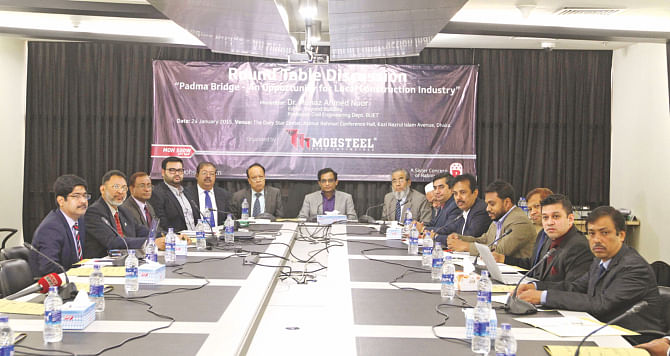Padma bridge creates scope for Tk 2,000cr business
Padma bridge creates scope for Tk 2,000cr business
Analysts say local steel and cement companies will get a boost from the project

The Padma bridge project will give a boost to local steel, cement, stone and sand industries as the biggest-ever infrastructure project of the country will source many of the construction materials locally.
Bangladeshi companies will get business worth Tk 2,000 crore to Tk 3,000 crore from the Tk 23,000-crore project, said Shamim Z Bosunia, president of the Institution of Engineers, Bangladesh (IEB).
He said Bangladeshi companies are producing high quality steel and cement and have excess capacity.
"They can supply reinforcing steel, not structuring steel. But, cement and sand will be sourced entirely from local companies," he said.
He spoke at a roundtable on "Padma bridge -- an opportunity for local construction industry" at The Daily Star Centre in the capital. Mohsteel Ltd, a subsidiary of Rahim Steel, organised the seminar.
Bosunia, a former professor of Bangladesh University of Engineering and Technology (Buet) and a member of a government panel of experts on the Padma bridge project, said state-owned Maddhapara Granite Mining Company Ltd is able to supply 15 percent of the total demand for stones.
There have been a lot of activities centring the bridge. A huge amount of money has been disbursed among the contractors, he said, adding that infrastructure and physical works are going on in full swing.
"There is no reason why we can't open the bridge for public by November 2018." The government plans to ready the bridge by 2019. The capacity of steel and cement makers is 7.5 million tonnes and 30 million tonnes a year, while annual consumption is four million tonnes and 18 million tonnes respectively.
Munaz Ahmed Noor, a professor of civil engineering at Buet, who moderated the discussion, said the bridge has to be built at any cost.
"Our engineers will work in the project. Technology will be transferred and many other jobs will be created."
Once completed, the 6.15-kilometre bridge is expected to boost Bangladesh's gross domestic product (GDP) by 1.20 percent and that of the south-western region of the country by 3.5 percent.
Abdus Sabur, vice president of the IEB, said many factories would be set up in the south-western region once the bridge is built.
"Then it will not be a problem for us to achieve 8 percent GDP growth," he said.
Mohammad Mohsin, chairman of Mohsteel, said: "The Padma bridge is no longer a dream; it's a reality now."
Gholam Mustafa, chairman of the civil engineering divisional committee of the IEB, said had local companies been tagged with the foreign ones in building the bridge, local expertise would have developed.
Kabir Ahmed Bhuiyan, chief engineer of the Public Works Department, said Bangladeshi civil engineers are qualified enough to meet the technical demand of the bridge project.
Mafizur Rahman, a professor of civil engineering department at Buet, said the project would offer a vast opportunity to development mid- and entry-level engineers.
Moazzem Hossain, a professor of civil engineering department at Buet, said, now is the best time to build the bridge as well as other major infrastructure as the sharp fall in oil prices would save about $3 billion to $4 billion annually for Bangladesh.
AMM Safiullah, vice chancellor of Ahsanullah University of Science & Technology, and Maruf Mohsin, managing director of Mohsteel Ltd, also spoke.